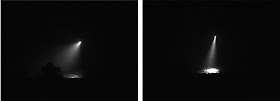by Julie Ann Sih
I see the boy from forty feet behind.
I'm standing in the back row of the choir—
an orchestra away, if I may coin
a unit of measurement—as Maestro Ling
nods, and this eleven-year-old child
rises from his chair onstage. The crowd
goes absolutely still. Two thousand people
generate a silence so intense,
it's vacuum-like. It hungers to be filled.
His tiny figure's haloed as the lights
strike his face. Of course, he cannot see
that halo; people never see their own.
The audience can't see it, either. I
imagine that, at first, they saw his suit
and thought, "A pint-sized congressman! How cute!"
or some such condescension. Maybe not.
They have their own experience of this.
I heard them laugh and murmur when he first
entered, just ahead of Master Ling,
who shook his hand. The concertmaster, too,
shook hands with him—the concertmaster who
once sang this very solo as a boy.
The audience is unaware of that;
they missed that revelation in rehearsal.
Perhaps they're less aware than we—the choir
and orchestra—that little boys grow up.
The schoolboy took his seat, and we began.
I focused on my score and Maestro Ling
and Bernstein's joyful noise, and nothing else,
until the raucous, boisterous first movement
ended with a bang, and then applause.
This audience, or some of it, at least,
does not know concert etiquette. Who cares?
They liked it, so they clapped for us. I smile.
Maestro Ling looks very happy, too.
But now the crowd becomes a vast abyss
of silence. Their attention's near-ferocious.
The schoolboy stands and faces it, untrembling.
Two thousand minds are focused on one point,
like Archimedes' fabled concave mirror.
The outline of the schoolboy's head is glowing.
At least on top. At least from where I stand.
That halo is invisible to most,
yet all can sense the sacredness of this
communal concentration. No one breathes.
No one but the boy, who fills his lungs
with harp arpeggio, and then exhales
King David's lyrics: "
A-do-nai ro-i."
("Lord," and then "my shepherd." There's no verb
between the two. Our minds supply the "is,"
the being. It's ontology in action.)
Then, higher, "
Lo eḥ-sar." ("I shall not want.")
Two lung-shaped harps provide him with the air
he needs. He's breathing music, in and out.
Or so it seems to me, from where I stand.
He has his own experience of this.
I don't know what he's thinking, what it means
to him, to sing these syllables he's learned
by rote, by heart, meticulously; I
presume he found them meaningless at first.
I don't know what it means to him to sing
before so many strangers, and his friends.
Which group is more intimidating? I
am well aware that children can be cruel.
Their cruelty is proverbial, in fact,
though not so much as children's innocence.
That innocence, that purity of tone,
is what arrests us now—especially
those of us who do not understand
each Hebrew word he translates into song.
His nervous imperfections in rehearsal
are mostly gone tonight. A few remain.
I'm sure he's conscious of those little flaws.
How fervently I hope he also knows
how very insignificant they seem
compared to all he's getting oh-so-right.
Reality's imperfect. This is real.
* * *
My cue now. We sopranos start to sing.
We make our low notes louder, high notes soft
and sweet and pure—as pure as we adults
can make them. Bernstein wrote this piece for boys
to sing with men. We women must be boys,
faux-boys, for twenty minutes, more or less.
Suddenly, the words we sing remind me:
I saw another solitary figure
from behind, before a crowd, today
in San Diego, only blocks away.
(On video, and not firsthand. But still.)
A man walked backward, several yards before
the dark-clad dozens of the riot squad.
Three members of them suddenly broke ranks
and ran to take him down. "Yea, though I walk..."
we women sing. (I see him walking backward,
holding up a sign, which they will trample.)
"...through the valley of the shadow..." (Through
a tall-grassed gully in a median,
lined on either side with more police,
like human walls, in blue that's nearly black.)
"...of death..." (To some, that's pure hyperbole,
but I feel sure I'm witnessing a death:
the death of certain freedoms I hold precious.)
"...I will fear no evil," we keep singing,
"for You are with me." Then the irony
nearly makes me smile: "Your rod, your staff,
they," we emphasize, "they comfort me."
(I picture those police batons, in contrast.)
A strict authoritarian utopia
would be a comfort, I've no doubt, to many
who came to hear The Donald speak today.
"The Lord['s] my shepherd," though, I quietly
insist, with all the women of the choir.
Although I've no idea what they're thinking—
they have their own experience of this—
I want to claim this solidarity.
I want a lot of things I do not have.
Then "
lo eḥ-sar" again. ("I shall not want.")
* * *
That vow gets interrupted. Human nature
pines for power, aches to be important,
longs to feel superior to others
(morally or not), to harbor grudges,
to smite the ones we hate and call it justice.
The tenors and the basses—rival gangs
from
West Side Story now—spit out Psalm Four,
a psalm of lamentation and aggression.
My right ear's ringing: one percussionist
(of many) punctuates their violence
with something loud and wooden, called a whip.
The tenors' and the basses' vicious quarrel
rages on for pages of the score.
How relevant this seems. Just hours ago,
just blocks from here, two other rival groups
were shouting at each other. Tempers flared.
With bad behavior taking place on both
the pro- and anti- sides, a witness claimed
some acts of violence performed themselves:
"Slurs were flung, and water bottles, too."
"Arrests were made," a city spokesman said,
unblamingly. Passivity absolves.
But placing blame's not always helpful, either.
The schoolboy and the women sang of peace;
then warlike men burst in to mess things up.
That seems a tempting paraphrase of this
part of Bernstein's music, but it's far
from accurate. (For one thing, we're not women
now; we're boys.) Of course I'd like to think
the group I'm in is innocent and pure
and on the path of righteousness. Of course
I'd like to say testosterone's the problem.
I can't, though. As I child, I teased a classmate
till she attempted suicide. I know
that innocence and ignorance can be
almost indistinguishable, sometimes.
Men have no monopoly on evil.
We altos and sopranos start to prove it.
We blithely boast of dining in the presence
of those who wish us ill—presumably
to make them eat their hearts out while we feast.
The tenors and the basses go on grumbling;
we celebrate. Our cup is overflowing.
Our childlike trust in God has now become
childishness—a spiteful sort of glee.
Our God provides for us, and not for you.
You don't deserve the blessings we enjoy.
This attitude of smugness isn't David's.
It isn't even Bernstein's, who has written
this part with such simplicity. I know
this misinterpretation is in tune
with neither, and is only in my head.
It's there because so often nowadays
I hear that sort of willful ignorance
of others' wants and needs and grievances—
some of them legitimate. I think of
the rancor flung at refugees this year.
Reality's imperfect. This is real.
This selfishness is who we are, at times.
"
Ach, ach, tov," the schoolboy now asserts:
"Ah, ah, goodness—
tov va-ḥe-sed—goodness
and mercy" (to be passed along to others,
I'd like to think, not hoarded for ourselves),
"may they pursue me all the days of my life,
that I may dwell in the house of the Lord forever."
We notarize this statement with the stamps
A-do-nai ro-i and
lo eḥ-sar.
The orchestra won't let the men's objections
rest, though. It keeps quietly complaining
beneath our would-be-tranquil final note.
It's hard to hold that held-out A on pitch.
Reality's imperfect. This is real.
* * *
The movement ends, to thunderous applause.
The schoolboy sits. I don't know what he's feeling.
He has his own experience of this.
The third and final movement now begins
in agony—a mockery of joy.
The strings are screaming dissonantly, weeping
the same motif we singers had proclaimed
so jauntily to start the suite. A trumpet
sadly echoes what the schoolboy sang:
"
Ach, ach, tov" and "
tov va-ḥe-sed"—though
it's anything but
tov, from my perspective.
I try to weigh that goodness and that mercy
against the Holocaust. And Hiroshima.
Just yesterday, our president acknowledged
what happened there to non-combatants. Children.
The trumpet seems bewildered, not ironic.
* * *
But out of such catastrophe and grief,
the gentle harps awaken. Now the men,
in unison, and legatissimo,
embark on Psalm One Hundred Thirty-One.
Their tenderness and strength unite in ways
appropriate for men. They're neither women
nor children. They're exactly who they are,
and beautiful in that identity.
We women join them, eager to reclaim
a toddler's sense of trust and comfort, lost
in harshness of experience. We sing
together for a while, then soloists
express more individuality.
The orchestra supports them as they float.
And finally the instruments drop out
entirely. The choir is on our own,
levitating—nothing holds us up—
singing pianiss-iss-iss-imo
(yes, four p's): miraculously tiny.
I don't think I can manage it, but do.
My note's so high, yet somehow kept within
the finely-woven fabric of the choir,
so delicate and seamless, top to bottom,
diaphanous and shimmering like silk,
hovering like magic in midair.
"Behold," we sing, we conjurers. We've switched
the psalm on them. "
Ma tov—how good [it is]"
(the Being's just implied, again) "and how
pleasant [it is], when brethren dwell united."
To this we sing
Amen. The trumpet quotes
the five-note theme that started all of this
across our final word. Maestro Ling
holds it out impossibly, and then
releases it to heaven with his wrist.
Nothing moves. Maestro looks ecstatic.
The crowd's been rendered breathless once again.
Then Maestro blows a kiss to us. Applause.
Julie Ann Sih is a member of the San Diego Master Chorale.






























